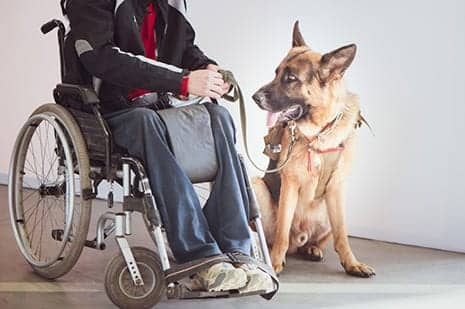New data published in The American Journal of Occupational Therapy suggests the impact of a service dog may extend beyond the recipient and have positive impacts on family members as well.
This study, funded by Elanco Animal Health Incorporated and conducted by Purdue University College of Veterinary Medicine, used standardized measures to examine the relationship between the human animal bond and psychosocial outcomes among people with service dogs.
Working alongside the Purdue University College of Veterinary Medicine, Elanco is leading a four-year primary research study on the emotional and health benefits people receive from service dogs.
“Our goal was to apply strong science in quantifying the effects that these dogs can have on well-being,” says Maggie O’Haire, Associate Professor of Human-Animal Interaction at Purdue University. O’Haire led the research along with Jessica Bibbo and Kerri Rodriguez, graduate student, Human-Animal Interaction.
“The research also reveals the distinctive role that a service dog may have in the lives of the families of those individuals,” O’Haire states, in a media release from Elanco.
“Previous smaller and chiefly qualitative studies have found preliminary evidence that service dogs can have psychosocial benefits among individuals with physical disabilities, but the research has been limited,” shares Tony Rumschlag, DVM, Director, Consulting Veterinarians, US Companion Animal Business Unit, Elanco.
“It’s gratifying to help further scientific understanding about the human-animal bond,” he adds. “As veterinarians, in-depth knowledge about the mechanisms of that relationship will enable us to truly partner with owners on pet care.”
The Purdue study results indicate that compared to those on a waitlist to be matched with a service dog, individuals with a service dog exhibited significantly better psychosocial health, including higher levels of social and emotional functioning, and better functioning at work and/or school.
To reach the research goal, the researchers recruited 154 individuals to participate in a cross-sectional survey, including 97 placed with a mobility or medical service dog and 57 on the waitlist to receive one.
Hierarchical regression evaluated the effect of having a service dog on standardized measures of psychosocial health (Pediatric Quality of Life Inventory) as well as anger, companionship and sleep disturbance (Patient-Reported Outcomes Measurement Information System). Among those with a service dog, the Monash Dog Owner Relationship Scale quantified the human-animal bond, the release continues.
Previous results from the study, “The effects of service dogs on psychosocial health and well-being for individuals with physical disabilities or chronic conditions,” were published in the journal Disability and Rehabilitation in January 2019.
The participants were recruited from the database of Canine Assistants, a provider of mobility and medical service dogs for a variety of physical conditions and disabilities.
[Source(s): Elanco Animal Health Incorporated, Business Wire]




